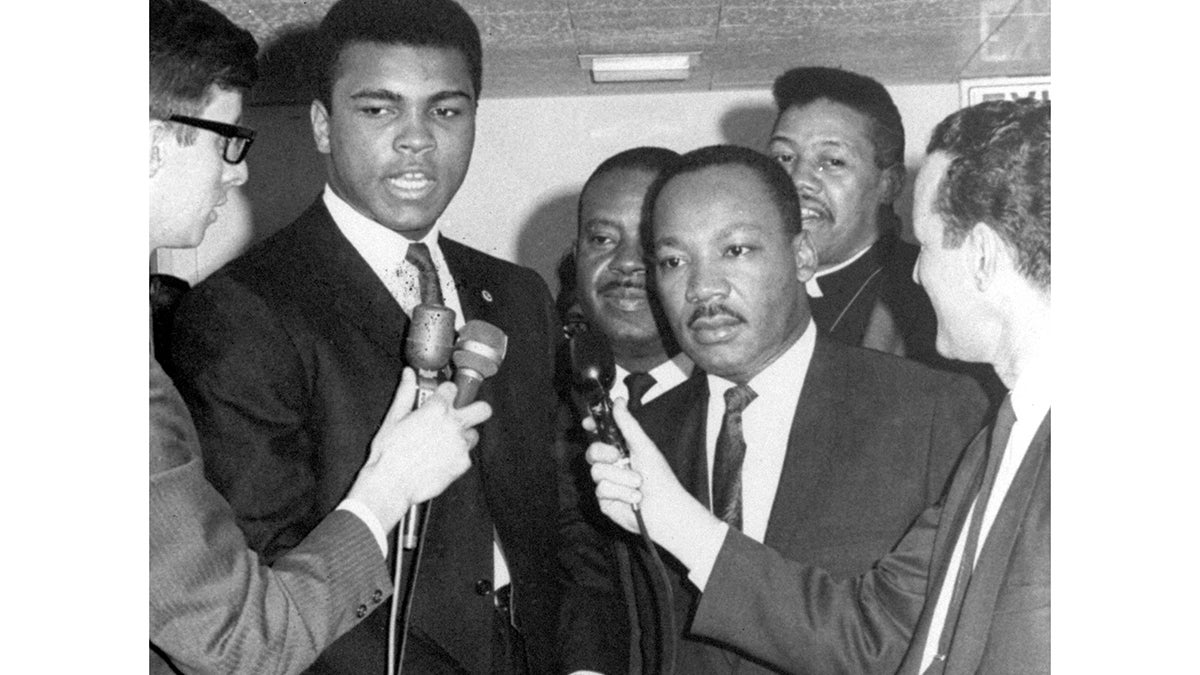Muhammad Ali’s biggest fights took place outside the ring

In this March 29
When Muhammad Ali died on Sunday, we not only lost the world’s greatest boxer. We lost a man of courage and conviction.
In 1967, Ali declared himself a conscientious objector to the war in Vietnam. As a minister in the Nation of Islam, Ali not only refused to take the oath of induction into the Army on religious grounds. He used his platform as one of the world’s best-known athletes to speak against the war on racial grounds. The words he uttered stung more than any punch he threw in the ring.
“My conscience won’t let me go shoot my brother, or some darker people, or some poor hungry people in the mud for big powerful America,” Ali said years after he refused to serve in the Army when he was drafted. “And shoot them for what? They never called me nigger, they never lynched me, they didn’t put no dogs on me, they didn’t rob me of my nationality, rape and kill my mother and father … Shoot them for what? How am I gonna shoot them? Poor little babies and children and black people. How can I shoot them poor people? Just take me to jail.”
It was a bold stand—one that could have cost Ali his life. That’s why, in my estimation, it wasn’t boxing that set Ali apart from others who donned the gloves. It was his outspoken and unyielding fight for justice outside the ring.
When Ali refused to join the Army, he was stripped of everything. Arrested, charged and convicted of violating Selective Service laws, he was sentenced to five years, but remained free on appeal. Before the U.S. Supreme Court overturned the conviction, Ali lost his boxing titles, his license to fight in America, and he was denied a visa to fight overseas.
Prior to a brief return to the ring to fight Jerry Quarry in 1970, Ali was destitute. He once had to break his wife’s piggy bank for gas money to get to three college speaking engagements that paid $1,500 apiece.
The boxer who’d made his living beating hulking fighters was now fighting ideological battles with college students. In one of the more famous exchanges, a young man challenged Ali’s reasoning for objecting to the war.
As the cameras rolled, Ali’s words flew fast and furious, just like his punches.
“You talking to me about some draft and all of you white boys are breaking your neck to get to Switzerland and Canada and London,” Ali said to the student who’d dared to question him. “I’m not gonna die fighting to help nobody get something Negroes don’t have.
“If I’m gonna die I’ll die now right here fighting you, if I’m gonna die. You my enemy. My enemies are white people, not Viet Cong or Chinese or Japanese. You’re my opposer when I want freedom. You’re my opposer when I want justice. You’re my opposer when I want equality. You won’t even stand up for me in America for my religious beliefs. And you want me to go somewhere and fight, but you won’t even stand up for me here at home.”
Sadly, much of what Ali said was true. And despite the racial strife we continue to face decades later, it’s hard to deny that the grip of institutionalized racism has loosened in America.
Over the years, Ali’s beliefs evolved. And just as he rightly fought for black equality when we desperately needed him to do so, he stood for peace when the world required a trusted voice.
“The man who views the world at 50 the same as he did at 20 has wasted 30 years of his life,” Ali said in an interview with Playboy in 1975.
He bore out that statement with his actions.
After retiring from boxing, Ali announced in 1984 that he suffered from Parkinson’s disease, a degenerative neurological condition. Then he threw himself into philanthropy. He raised funds for the Muhammad Ali Parkinson Center. He supported the Make-A-Wish Foundation and the Special Olympics. And in 1996, Ali lit the Olympic flame at the Summer Olympics in Atlanta.
Thankfully, Ali received his flowers while he was still with us. He accepted the Presidential Medal of Freedom from President George W. Bush in 2005, and the President’s Award from the NAACP in 2009.
It was often said that at six-foot-three, Ali was imposing inside the ring, but with all that he stood for outside of boxing, Ali was a giant in life.
He will be sorely missed.
Listen to Solomon Jones from 7 to 10 am weekdays on 900 am WURD
WHYY is your source for fact-based, in-depth journalism and information. As a nonprofit organization, we rely on financial support from readers like you. Please give today.


